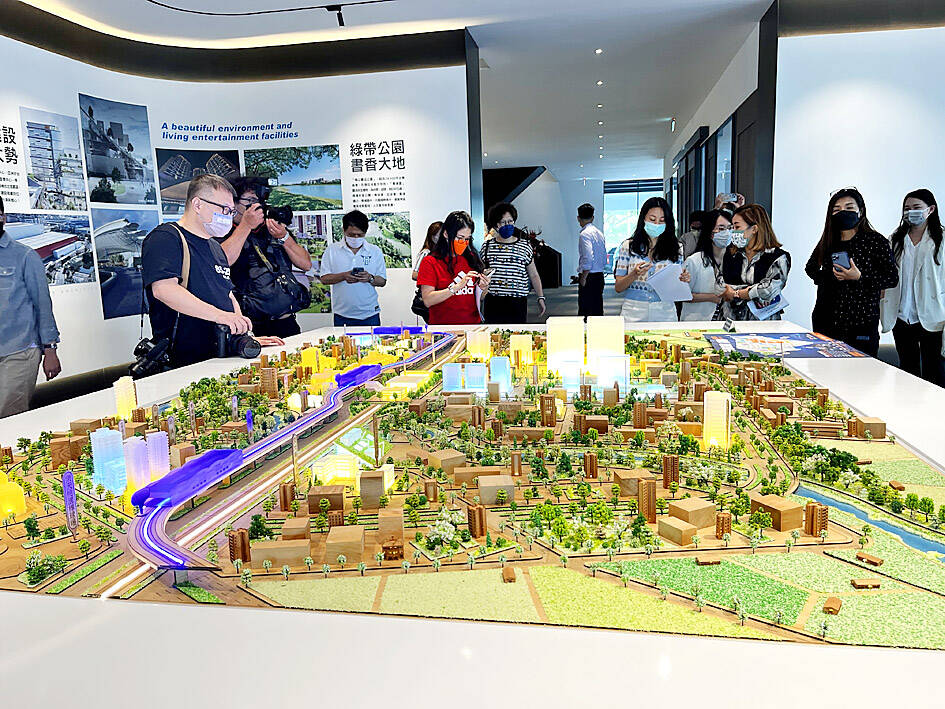Housing affordability deteriorated in the second quarter, with the mortgage burden picking up 1.27 percent to 39.62 percent nationwide, while housing prices climbed to 9.69 times household income, a survey released by the Ministry of the Interior on Sunday showed.
The uptrend in unaffordability came after median house prices in the nation rose 0.46 percent to NT$8.5 million (US$269,260) per unit from NT$8.4 million in the first quarter, while interest rates on new mortgages climbed from 1.358 percent to 1.592 percent, the ministry said.
The readings likely evolved in the same direction last quarter after the central bank last month announced another rate hike of 0.125 percentage points, while housing prices held firm amid rising building material and labor prices, it said.

Photo: Hsu Yi-ping, Taipei Times
The ministry classifies mortgage burdens of more than 50 percent of income as “extremely high,” between 40 and 50 percent as “high,” and less than 30 percent as “reasonable.”
The unaffordability reading was much sharper in Taipei, with housing prices equivalent to 16.17 times average household income and 66.12 percent of the money going to mortgage payments, the ministry said.
Housing prices amounted to 12.82 times household income in New Taipei City, with mortgage burdens taking up 52.41 percent, it said.
Mortgage burdens in Taichung climbed to 45.54 percent of household income, and constituted 38.26 percent and 38.17 percent of household income in Tainan and Kaohsiung respectively, the ministry said.
Taoyuan had a relatively reasonable mortgage burden of 32.01 percent — the lowest among the six special municipalities — as housing prices stood at 7.83 times household income, it said.
By absolute value, housing prices in Keelung, Chiayi, Yunlin and Pingtung met the reasonable test of less than 30 percent of household income, it said.
The ministry urged people to exercise caution, as long-term mortgages are vulnerable to interest rate adjustments.

UNCERTAINTY: Innolux activated a stringent supply chain management mechanism, as it did during the COVID-19 pandemic, to ensure optimal inventory levels for customers Flat-panel display makers AUO Corp (友達) and Innolux Corp (群創) yesterday said that about 12 to 20 percent of their display business is at risk of potential US tariffs and that they would relocate production or shipment destinations to mitigate the levies’ effects. US tariffs would have a direct impact of US$200 million on AUO’s revenue, company chairman Paul Peng (彭雙浪) told reporters on the sidelines of the Touch Taiwan trade show in Taipei yesterday. That would make up about 12 percent of the company’s overall revenue. To cope with the tariff uncertainty, AUO plans to allocate its production to manufacturing facilities in

TAKING STOCK: A Taiwanese cookware firm in Vietnam urged customers to assess inventory or place orders early so shipments can reach the US while tariffs are paused Taiwanese businesses in Vietnam are exploring alternatives after the White House imposed a 46 percent import duty on Vietnamese goods, following US President Donald Trump’s announcement of “reciprocal” tariffs on the US’ trading partners. Lo Shih-liang (羅世良), chairman of Brico Industry Co (裕茂工業), a Taiwanese company that manufactures cast iron cookware and stove components in Vietnam, said that more than 40 percent of his business was tied to the US market, describing the constant US policy shifts as an emotional roller coaster. “I work during the day and stay up all night watching the news. I’ve been following US news until 3am

COLLABORATION: Given Taiwan’s key position in global supply chains, the US firm is discussing strategies with local partners and clients to deal with global uncertainties Advanced Micro Devices Inc (AMD) yesterday said it is meeting with local ecosystem partners, including Taiwan Semiconductor Manufacturing Co (TSMC, 台積電), to discuss strategies, including long-term manufacturing, to navigate uncertainties such as US tariffs, as Taiwan occupies an important position in global supply chains. AMD chief executive officer Lisa Su (蘇姿丰) told reporters that Taiwan is an important part of the chip designer’s ecosystem and she is discussing with partners and customers in Taiwan to forge strong collaborations on different areas during this critical period. AMD has just become the first artificial-intelligence (AI) server chip customer of TSMC to utilize its advanced

Six years ago, LVMH’s billionaire CEO Bernard Arnault and US President Donald Trump cut the blue ribbon on a factory in rural Texas that would make designer handbags for Louis Vuitton, one of the world’s best-known luxury brands. However, since the high-profile opening, the factory has faced a host of problems limiting production, 11 former Louis Vuitton employees said. The site has consistently ranked among the worst-performing for Louis Vuitton globally, “significantly” underperforming other facilities, said three former Louis Vuitton workers and a senior industry source, who cited internal rankings shared with staff. The plant’s problems — which have not